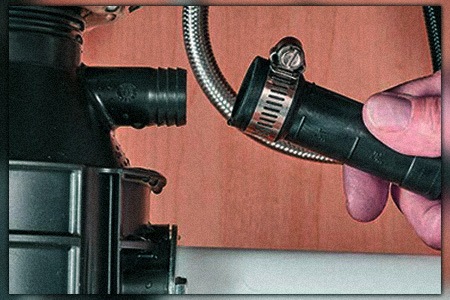Simple Ways to Repair a Leaky Waste Disposal Unit
Simple Ways to Repair a Leaky Waste Disposal Unit
Blog Article
We have uncovered this post involving How to fix a pretty consistent leak from my garbage disposal below on the internet and decided it made perfect sense to write about it with you here.

Waste disposal unit are crucial kitchen appliances that help in dealing with food waste effectively. However, a leaking garbage disposal can be a discouraging and untidy issue to handle. Thankfully, many leakages can be taken care of easily with a couple of easy actions. In this write-up, we will certainly go over how to repair a dripping garbage disposal efficiently.
Intro
Garbage disposals are set up under cooking area sinks and are made to shred food waste into smaller sized items, allowing it to pass through the plumbing system quickly. While these tools are generally dependable, leaks can occur over time due to wear and tear, loosened connections, or damages to the system.
Usual Causes of Leaks in Garbage Disposals
Worn Seals and Gaskets
Seals and gaskets play a critical role in stopping water from dripping out of the garbage disposal. With time, these components can weaken, leading to leakages around the disposal unit.
Loose Connections
The links in between the waste disposal unit and the plumbing system can end up being loose in time, triggering water to leakage out during operation.
Cracks or Openings in the Disposal Unit
Physical damages to the waste disposal unit, such as splits or openings in the real estate, can likewise cause leaks.
Determining the Source of the Leak
Before trying to repair a dripping waste disposal unit, it is vital to determine the source of the leak. This can generally be done through visual assessment or by performing easy examinations.
Visual Examination
Inspect the garbage disposal unit meticulously for any type of indications of water leakage. Pay close attention to locations around seals, gaskets, and link points.
Evaluating for Leaks
One method to check for leaks is by running water via the disposal system and looking for any noticeable signs of leakage.
Devices and Materials Needed for Repairing a Leaking Waste Disposal Unit
Before beginning the fixing procedure, collect the necessary tools and products, consisting of a screwdriver, adjustable wrench, plumbing professional's putty, substitute seals or gaskets, and epoxy or patching product for repairing fractures or openings.
Step-by-Step Overview to Repairing a Leaking Waste Disposal Unit
Shut off the Power
Before attempting any type of fixings, make sure that the power to the waste disposal unit system is switched off to stop the danger of electric shock.
Locate the Leak
Identify the exact place of the leakage and identify the reason.
Tighten up Links
Use a wrench to tighten up any loosened connections in between the disposal system and the plumbing system.
Replace Seals or Gaskets
If the leakage results from worn seals or gaskets, eliminate the old elements and replace them with new ones.
Patching Cracks or Holes
For fractures or holes in the disposal unit, use epoxy or an ideal patching product to seal the damaged area.
Checking the Waste Disposal Unit After Fixing
Once the repair is full, evaluate the waste disposal unit by running water via it to make certain that the leakage has been fixed.
Preventive Maintenance Tips to Prevent Future Leakages
To stop future leaks, it is necessary to perform normal maintenance on your waste disposal unit. This includes keeping it tidy, preventing placing non-food products or difficult items down the disposal, and occasionally checking for leakages or various other issues.
Conclusion
To conclude, fixing a dripping garbage disposal is a reasonably simple procedure that can be completed with standard tools and products. By complying with the steps laid out in this write-up and exercising preventative maintenance, you can keep your waste disposal unit in good working problem and prevent pricey fixings in the future.
What to Do About a Leaking Garbage Disposal
A leaking garbage disposal often goes unnoticed until you confront a sopping cabinet, a foul-smelling puddle, or an audible drip-drip-drip from the unit. The fix can be frustrating, too, because the leak can stem from a number of components in the system. Fortunately, with a little sleuthing, you can zero in on the leak and—depending on the exact location—stop the icky oozing and repair the component that caused it. Worst case scenario, if it turns out that the garbage disposal must be replaced, installing a new one is a reasonable do-it-yourself task for those with basic plumbing skills. Read on to keep the cash you’d otherwise hand over to a pro.
Prepare to find the leak
Prior to testing the garbage disposal for leaks, unplug it at the wall outlet and turn off the power from the breaker box to prevent electrical shock. Then insert a watertight sink stopper into your sink drain and wipe the unit dry with a clean cloth. In any handy container, mix a few drops of food coloring into a few cups of water, and pour the dyed water onto the sink stopper to help you locate the leak.
Investigate the source
the top, where the disposal meets the sink drain the side, where the dishwasher hose or main drain pipe connects to the disposal or the bottom of the unit Inspect each of these locations while gliding a light-colored rag over the unit; the dyed water will readily show on the rag and reveal the location of the leak. If a leak isn’t immediately apparent, remove the sink stopper and pour a few more cups of dyed water down the sink drain, then check for leaks again. Leaks near the top of the unit are more likely to show themselves while the sink is plugged, while side and bottom leaks are more noticeable while the sink is unplugged.
The metal sink flange that sits directly inside the sink drain is typically sealed around the top with plumber’s putty (a clay-like sealant) and then secured from under the sink with bolts. If the plumber’s putty deteriorates, or the bolts loosen, the flange can no longer form a watertight seal between the sink drain and the disposal—which could cause a leak at the top of the unit.
To reseal the leaky flange, you must first detach the garbage disposal. Start by loosening the screws securing the main drain pipe to the disposal, then loosen the screws in the metal clamp securing the dishwasher hose to the disposal and detach the drain pipe and dishwasher hose from the disposal. Loosen the screws in the mounting ring that connects the disposal to the metal mounting assembly beneath the sink, then pull down the disposal and carefully set it on a clean, dry surface. Loosen the bolts in the mounting assembly with a wrench, then pull down the mounting assembly and set it near the disposal.

I'm very focused on Tips on Fixing a Leaking Garbage Disposal and I really hope you appreciated our blog posting. Enjoyed our blog entry? Please share it. Let other people locate it. Bless you for your time. Visit again soon.
Visit The Following Page Report this page